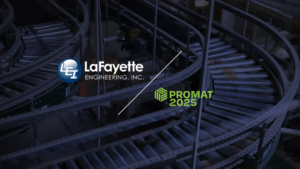Table of Contents
Industrial automation is revolutionizing the manufacturing sector, providing businesses with unprecedented efficiency, precision, and reliability. By integrating advanced technologies and automated systems, companies can streamline their operations, reduce costs, and significantly enhance productivity. At Lafayette Engineering, we specialize in delivering state-of-the-art industrial automation solutions tailored to meet the unique needs of our clients.
What is Industrial Automation?
Industrial automation involves the use of control systems, such as computers or robots, and information technologies for handling different processes and machinery in an industry to replace human intervention. It goes beyond mechanization, where human operators are replaced by intelligent systems capable of controlling industrial processes autonomously. This shift towards automation has paved the way for smarter manufacturing processes, allowing for real-time adjustments, enhanced precision, and significant improvements in production efficiency.
Key Benefits of Industrial Automation
- Enhanced Efficiency: Automated systems operate with greater speed and accuracy than human workers, significantly boosting production rates and ensuring consistent quality. This efficiency leads to faster turnaround times and increased capacity, allowing businesses to meet high demand without compromising on quality. For example, in automotive manufacturing, robotic arms can assemble parts with a precision and speed that human workers cannot match, leading to faster production cycles and higher output.
- Cost Reduction: By minimizing the need for human intervention, industrial automation reduces labor costs and minimizes the potential for human error. This results in substantial cost savings, particularly in labor-intensive industries. For instance, a packaging plant that automates its assembly line can reduce the number of workers needed, leading to significant savings in wages and benefits, while also reducing the risk of costly mistakes.
- Improved Safety: Automation can take over dangerous tasks, reducing the risk of workplace accidents and injuries. This creates a safer working environment for employees and helps companies comply with stringent safety regulations. In industries such as mining and chemical processing, automated systems can handle hazardous materials and environments, protecting workers from exposure to dangerous substances and conditions.
- Increased Flexibility: Automated systems can be easily reprogrammed to handle different tasks or adapt to new production requirements. This flexibility allows businesses to quickly respond to market changes and customer demands. For instance, a manufacturing plant can reconfigure its automated production line to switch from producing one product to another with minimal downtime, enabling it to adapt to shifting consumer preferences and market trends.
- Data Collection and Analysis: Advanced automation systems are equipped with sensors and data collection tools that provide real-time insights into production processes. This data can be analyzed to identify bottlenecks, optimize operations, and predict maintenance needs, ensuring minimal downtime and maximum efficiency. For example, in the food and beverage industry, automated systems can monitor production conditions such as temperature and humidity, ensuring consistent product quality and enabling quick adjustments to maintain optimal conditions.
- Consistency and Quality Control: Automated systems ensure that each product is manufactured to the same exacting standards, reducing variability and enhancing quality control. This consistency is crucial in industries such as pharmaceuticals and electronics, where even minor deviations can result in significant product failures. By maintaining strict quality control, automated systems help ensure that products meet regulatory standards and customer expectations.
- Scalability: Industrial automation allows businesses to scale their operations without a corresponding increase in labor costs. Automated systems can handle increased production volumes without the need for additional workforce, making it easier for businesses to grow and expand. For example, a logistics company can automate its sorting and distribution processes, enabling it to handle a larger volume of packages without increasing its workforce, thereby reducing operational costs and improving efficiency.
Our Services
At Lafayette Engineering, we provide a comprehensive range of industrial automation services designed to optimize your production processes and enhance overall efficiency. Our offerings include:
- System Integration: We design and implement integrated automation systems that seamlessly connect various components of your production line, ensuring smooth and efficient operations. By integrating different systems and technologies, we create a cohesive and streamlined production process that maximizes efficiency and minimizes downtime.
- Custom Automation Solutions: We develop tailor-made automation solutions to address the specific challenges and requirements of your business. Our team of experts works closely with you to understand your unique needs and design solutions that improve productivity, reduce costs, and enhance overall performance.
- Robotics and Machine Vision: We specialize in deploying robotic systems and machine vision technology to automate complex tasks and improve quality control. Our solutions include robotic arms for assembly and welding, machine vision systems for inspection and quality assurance, and automated guided vehicles for material handling.
- Control Systems Design: Our team of experts designs sophisticated control systems that provide precise control over your production processes. We develop custom control software and hardware solutions that ensure accurate and reliable operation, improving efficiency and reducing the risk of errors.
- Maintenance and Support: We offer ongoing maintenance and support services to ensure your automation systems operate at peak performance. Our services include regular inspections, preventive maintenance, and troubleshooting to minimize downtime and extend the lifespan of your equipment.
For more information about our services, visit Lafayette Engineering and connect with us on LinkedIn.

Frequently Asked Questions (FAQs)
1. What industries can benefit from industrial automation?
Industrial automation can be beneficial across various industries, including manufacturing, automotive, aerospace, pharmaceuticals, food and beverage, and logistics. Any industry that relies on repetitive tasks, precision, and high production volumes can see significant improvements with automation.
2. How does industrial automation impact employment?
While industrial automation can reduce the need for manual labor in certain tasks, it also creates new opportunities for skilled workers to manage, maintain, and optimize automated systems. Additionally, it can lead to the creation of new roles in programming, engineering, and data analysis. Automation can shift the workforce towards more specialized and higher-paying jobs, enhancing overall employment quality.
3. What are the initial costs involved in implementing industrial automation?
The initial costs of industrial automation can vary depending on the complexity of the systems and the specific requirements of the business. However, the long-term savings in labor, increased productivity, and reduced errors often outweigh the initial investment. Many companies also find that financing options and government incentives can help offset the upfront costs of automation.
4. How can businesses ensure the security of their automated systems?
To ensure the security of automated systems, businesses should implement robust cybersecurity measures, including firewalls, encryption, and regular software updates. It is also crucial to conduct regular security assessments and provide training to employees on best practices for cybersecurity. At Lafayette Engineering, we can assist in developing and implementing comprehensive cybersecurity strategies to protect your automated systems.
5. What role does data play in industrial automation?
Data plays a critical role in industrial automation by providing valuable insights into production processes, identifying areas for improvement, and predicting maintenance needs. Advanced data analytics can help optimize operations, reduce downtime, and enhance overall efficiency. By leveraging data, businesses can make informed decisions that drive continuous improvement and innovation.
6. How can Lafayette Engineering help with the transition to industrial automation?
At Lafayette Engineering, we offer end-to-end support for transitioning to industrial automation. From initial consultation and system design to implementation, training, and ongoing maintenance, our team of experts will work closely with you to ensure a smooth and successful transition. We provide customized solutions that meet your specific needs and help you achieve your business goals. Contact us today to learn more about how we can help your business thrive with industrial automation.
How Industrial Automation Can Help Your Business
Industrial automation is transforming the way businesses operate, offering numerous benefits such as enhanced efficiency, cost reduction, improved safety, increased flexibility, and valuable data insights. By partnering with Lafayette Engineering, you can leverage our expertise to implement cutting-edge automation solutions that drive your business forward.
For further details on how industrial automation can benefit your business and to explore our range of services, visit Lafayette Engineering and connect with us on LinkedIn. Embrace the future of manufacturing with industrial automation and take your business to new heights of success.



